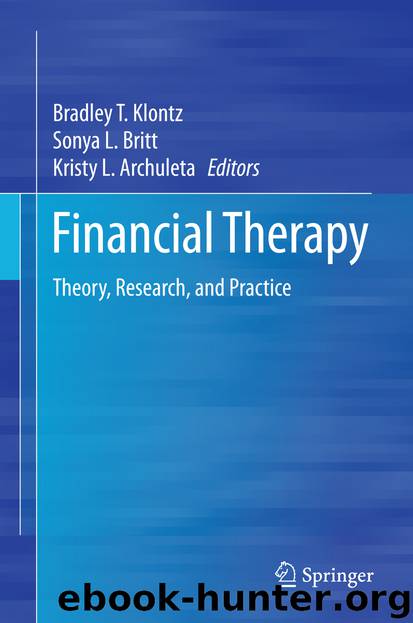Financial Therapy by Bradley T. Klontz Sonya L. Britt & Kristy L. Archuleta

Author:Bradley T. Klontz, Sonya L. Britt & Kristy L. Archuleta
Language: eng
Format: epub
Publisher: Springer International Publishing, Cham
Empowerment in Financial Therapy
With theoretical underpinnings then established, it becomes necessary to address how empowerment is relevant to work in financial therapy, and how it would be defined or conceptualized through the FFEM’s theoretical lenses. To empower is to help individuals who feel inadequate in handling a situation to discover the capabilities that reside within them. Blanchard et al. (2001) described the facilitation of empowerment as a process that makes it possible for individuals to recognize and gain complete access to their internal power, security, and influence. Facilitating empowerment makes it possible for individuals to utilize that power and strength when engaging with themselves, others, and society and its various institutions (Blanchard et al. 2001).
The FFEM views the process of facilitating empowerment within financial therapy in similar ways. From a narrative therapy perspective, the belief is that it is possible for clients to rewrite their stories, thereby creating a more adaptive and preferred way of living, and the collaborative therapy process can assist in recognizing or anchoring this (Freedman and Combs 1996; Nichols and Schwartz 2007; White and Epston 1990). Similarly, the FFEM’s approach to financial therapy validates the notion that clients are strong and resourceful and have the ability to be powerful, productive, and motivated. Empowering clients involves facilitating a process in which clients can begin to assert themselves and more fully utilize their inherent strengths. Financial empowerment is arguably integral to financial health and well-being. When a client feels confident, motivated, and competent in dealing with important aspects of their financial life, they are becoming financially empowered (Ford et al. 2011). Ford et al. (2011) asserted that when a person feels empowered, they are more likely to take initiative and feel accomplished and successful.
The FFEM views the process of facilitating empowerment within financial therapy in similar ways. Empowering clients involves facilitating a process in which clients can begin to assert themselves and more fully utilize their inherent strengths. To understand the use of empowerment in the FFEM model, looking at it in both a theoretical and cultural context is essential. To grasp the FFEM for financial therapy, it becomes necessary to establish how each theoretical model might view issues related to empowerment, and conversely, disempowerment (Ford et al. 2011).
Download
This site does not store any files on its server. We only index and link to content provided by other sites. Please contact the content providers to delete copyright contents if any and email us, we'll remove relevant links or contents immediately.
The Secret History by Donna Tartt(19097)
The Social Justice Warrior Handbook by Lisa De Pasquale(12192)
Thirteen Reasons Why by Jay Asher(8915)
This Is How You Lose Her by Junot Diaz(6891)
Weapons of Math Destruction by Cathy O'Neil(6282)
Zero to One by Peter Thiel(5805)
Beartown by Fredrik Backman(5761)
The Myth of the Strong Leader by Archie Brown(5511)
The Fire Next Time by James Baldwin(5451)
How Democracies Die by Steven Levitsky & Daniel Ziblatt(5221)
Promise Me, Dad by Joe Biden(5155)
Stone's Rules by Roger Stone(5089)
A Higher Loyalty: Truth, Lies, and Leadership by James Comey(4965)
100 Deadly Skills by Clint Emerson(4929)
Rise and Kill First by Ronen Bergman(4792)
Secrecy World by Jake Bernstein(4755)
The David Icke Guide to the Global Conspiracy (and how to end it) by David Icke(4721)
The Farm by Tom Rob Smith(4516)
The Doomsday Machine by Daniel Ellsberg(4492)
